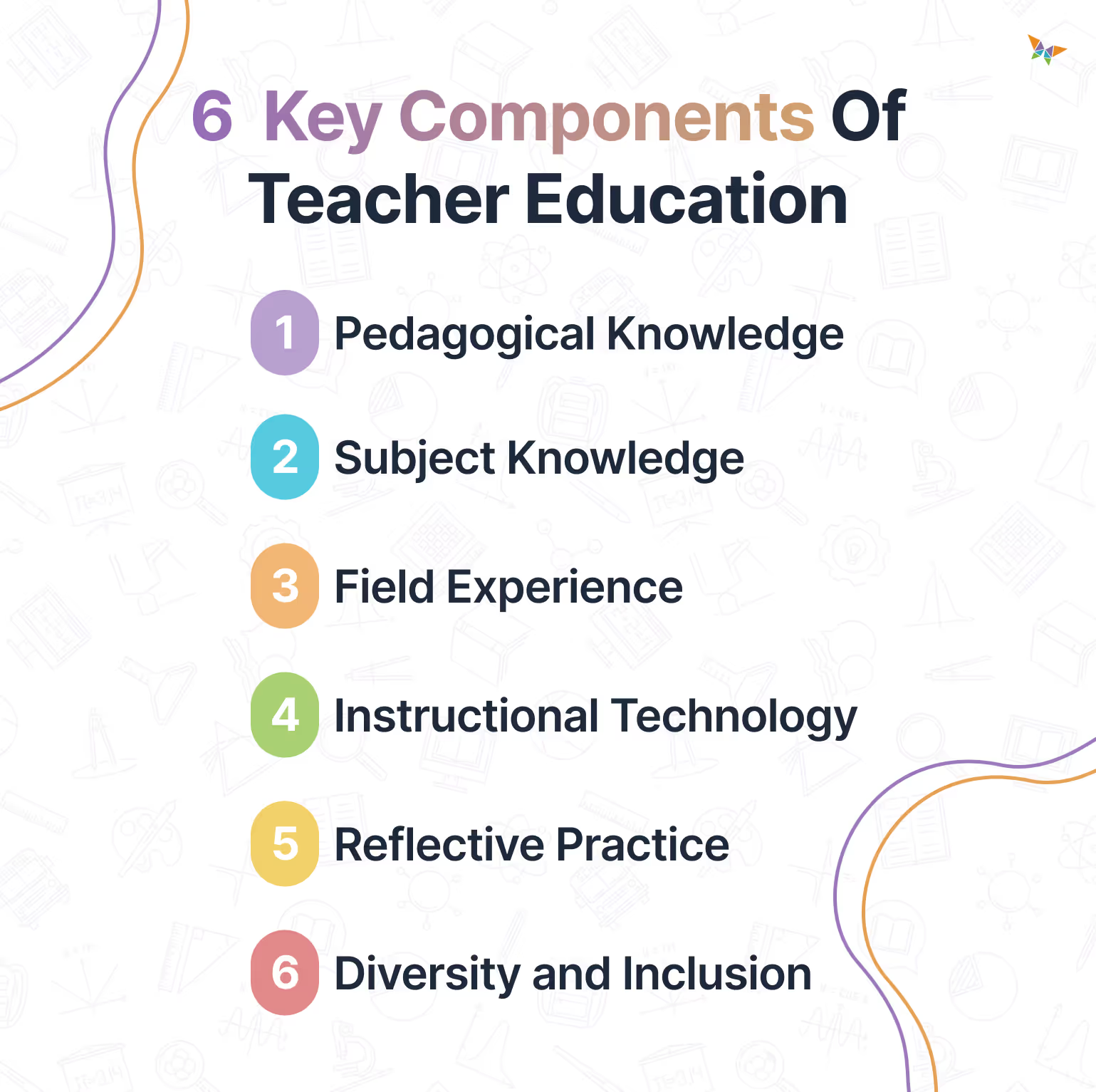Let’s start this blog with a few questions:
What if there were no teachers ? Who would teach the future generations to read, write, and do arithmetic? Wouldn’t we all be doomed to a life of illiteracy and a deficit of knowledge? The answer is unsettling: a void, an educational abyss.
Okay, perhaps that’s a tad dramatic, but let’s face it: teachers are the architects of our future. Without them, we wouldn't have doctors, engineers, or even other teachers! So, let’s pause for a moment and appreciate the tireless dedication that goes into being teachers–the educational superheroes.
Now, this takes us to a few more questions!
What does it take to become a teacher? What impact would it have on the quality of education of our future generations if there's no specialized training to become a teacher?

Thankfully, we don’t live in that world. Becoming a teacher involves more than just a love for teaching. It requires deliberate preparation, honing pedagogical skills, and mastering subject expertise. It’s where Teacher Education comes into play.
Consider this: without teacher education, our educational system would crumble like a house of cards. Quality education hinges on well-prepared teachers who understand the art of teaching. These skilled professionals don’t merely impart knowledge; they ignite curiosity, foster critical thinking, and shape the leaders of tomorrow.
In this blog, we’ll unravel what is teacher education—its purpose, components, and importance. Let’s begin by answering the elephant in the room.
Teacher education, in a nutshell, is the comprehensive training program designed to transform passionate individuals into superheroes of the classroom – the teachers our future generations deserve.
But how did this teacher education come to be? Believe it or not, there was a time when anyone with a good grasp of a subject could walk into a classroom and start teaching. Shocking, right?
However, as societies evolved and the demand for formal education intensified, the need for teacher education & specialized training became much more evident.
Imagine a world where your brain surgeon learned from watching medical dramas, or your pilot relied solely on a love of airplanes to navigate the skies. Sounds terrifying, doesn't it? Teaching is just as specialized, requiring a unique set of skills that go beyond simply knowing your subject matter.
.gif)
The idea of specialized teacher training, emphasizing the importance of teacher education, is a relatively new invention, emerging in the 19th century as education systems became more formalized. Alongside this expansion came the rise of teacher education institutions. Think of normal schools and colleges of education—as dedicated hubs for nurturing the next generation of teachers.
However, don’t confuse the meaning of teacher education with just theory and practice in isolation. It recognizes the importance of real-time experience. Through hands-on experiences, teaching practicums, and mentorship opportunities, aspiring teachers learn the ropes of effective instruction and classroom management.
So, earning a degree, certificate or diploma in teacher education isn't just some academic hoop to jump through. It's the crucial first step in creating a generation of incredible teachers who can unlock the potential within every student. Let’s move onto the next section and understand the key components of teacher education.
You’ve understood the meaning of teacher education. Together, we've established that teacher education isn't a magic trick – it's a powerful toolbox packed with essential instruments for aspiring educators. These tools empower them to not only manage a classroom, but to truly ignite a love of learning in their students.
So, let's crack open this toolbox and explore the 6 key components that make up a well-rounded teacher education program/training course:

1. Pedagogical Knowledge: The Art and Science of Teaching
First up, we've got pedagogy. It equips aspiring teachers with the science and art of instruction. Teacher education programs delve into various teaching methods, strategies, and approaches that they use to bring learning to life.
It's about understanding how students learn best and tailoring instruction to meet their diverse needs. Thus, addressing the need for teacher education to extend far beyond simply knowing your subject.
This ensures that aspiring teachers have a rich supply of new-age strategies to engage and motivate your modern students. Additionally, they master essential classroom management techniques and assessment practices, ensuring a well-oiled learning environment where every student thrives.
2. Subject Knowledge: Going Beyond the Textbook

Sure, anyone can memorize facts. But a truly effective teacher goes beyond regurgitating information. Teacher education programs cultivate a deep understanding of the subject matter.
This involves not just mastering core concepts, but also exploring different learning pathways and uncovering the "why" behind the "what."
Imagine a science teacher who can not only explain complex phenomena, but also design captivating experiments that spark curiosity and a love for scientific exploration in their students.
3. Field Experience: Putting Theory into Practice
Imagine learning to ride a bike solely by reading a manual. Not the most effective method, right? Teacher education programs (whether its a degree or diploma in teacher education) recognize the importance of field experience.
This is where aspiring educators get to test-drive their newfound knowledge and skills in real classrooms under the guidance of experienced mentors. Through placements and practicums, they gain invaluable hands-on experience, allowing them to refine their teaching approaches and build confidence before stepping into their own classrooms.
4. Instructional Technology: Embracing the Digital Age
Educational technology is also a key component of teacher education. This involves using new-age digital tools for lesson planning, creating interactive presentations, or even utilizing online resources for personalized learning experiences.
By embracing technology, they not only keep pace with the evolving world, but also engage students in innovative and exciting ways.
5. Reflective Practice: A Growth Mindset for Educators
When we talk about the meaning of teacher education, it is important to remember that it is a continuous learning journey, not a destination. Teacher education programs cultivate a growth mindset in aspiring educators by emphasizing the importance of reflective practice.
Reflective practice encourages them to pause, ponder, and assess your teaching practices. It's about asking the tough questions: What worked well? What could have been done differently?
This involves critically analyzing your teaching methods, student engagement, and overall classroom environment. By reflecting on successes and challenges, it helps them to continuously improve your practice and adapt to the ever-evolving educational landscape.
6. Diversity and Inclusion: Fostering a Thriving Learning Community

Every classroom is a melting pot of backgrounds, experiences, and perspectives. Thus, teacher education programs prepare you to create inclusive learning environments where all students feel valued and respected.
Teacher education programs recognize the fact that a classroom isn't just about rows of desks. It's a vibrant community where every student feels safe, supported, and empowered to reach their full potential.
This focus on inclusivity not only enriches the learning experience for all students, but also prepares teachers to become well-rounded individuals who can thrive in a diverse world.
Thus, the scope of teacher education is multifaceted. It equips teachers with a well-rounded skill set across various domains:These six components are the building blocks that transform passionate individuals into the skilled and dedicated teachers our students deserve.
Now that we’ve understood what is teacher education and its key components, let’s move onto understanding the need of teacher education.
By now, we've delved into the intricacies of teacher education, understanding its meaning and key components. But what is the need of teacher education? Why is it so essential? Let's unpack the critical reasons:
1. Ensuring Quality Education:
Teacher education is the bedrock of quality education. It ensures that educators are equipped with the necessary skills, knowledge, and pedagogical techniques to effectively engage students and facilitate meaningful learning experiences. Without proper training, the quality of education suffers, impacting student outcomes.
2. Professionalism and Standards:

Just as any other profession, teaching requires a set of standards and professionalism. Teacher education establishes these standards, emphasizing ethical practices, continuous professional development, and adherence to best teaching practices. It elevates teaching from a mere job to a respected and valued profession.
3. Meeting Diverse Student Needs:
Today's classrooms are diverse, comprising students with varying backgrounds, abilities, and learning styles. Teacher education prepares educators to address this diversity effectively, offering strategies for inclusive teaching practices and personalized learning experiences. Without this preparation, teachers may struggle to meet the needs of all students adequately.
4. Staying Relevant in a Changing Landscape:
The field of education is constantly evolving, driven by advancements in technology, changes in curriculum, and shifts in pedagogical approaches. Teacher education ensures that educators stay abreast of these changes, equipping them with the skills to navigate the dynamic educational landscape effectively. It fosters adaptability and innovation, essential qualities for success in the modern classroom.
So as you can see, there is an immense need for teacher education. Infact, it is the cornerstone of a thriving educational system. It empowers you to inspire, motivate, and empower the next generation of learners, ensuring that every student has the opportunity to reach their full potential.
Now that we’ve understood the need of teacher education, let’s understand how you can begin your teacher education journey.

So, you are eager to embark on your own journey in education. Fantastic! Here's a roadmap to guide you through the exciting first steps of your teacher education:
1. Find Your Niche: Making the Choices!

The first step is to identify your educational sweet spot. Here are a few things to focus upon:
Age Group:
Do you envision yourself energizing a classroom of curious kindergartners, fostering critical thinking skills in high school students, or guiding teenagers through the complexities of adolescence? Each age group presents unique challenges and rewards, so pinpointing your preference will help you navigate the next steps.
Public vs. Private Schools:
Now that you have a sense of your ideal student age group, consider the school environment that best suits you. Public schools offer a diverse student body and the opportunity to make a significant impact on a wider community.
Private schools often have smaller class sizes and potentially more resources, but may cater to a specific student population. Researching the philosophies and environments of both public and private schools will help you determine where you see yourself thriving.
Subject Specialization:
With your age group and school environment in mind, you can start to explore potential subject specializations. Do you dream of nurturing a love for literacy or igniting a passion for science or sparking historical curiosity in high school students?
Many teacher education programs allow you to focus on a particular subject while also gaining the necessary pedagogical skills to be a well-rounded educator.
By considering these three factors – age group, school environment, and subject specialization – you'll be well on your way to defining your niche within the vast landscape of education.
2. Researching Programs: Finding the Right Fit
Once you have the clarity, What is teacher education, there are various paths you can take. Research different programs offered by colleges and universities.
Consider factors like program focus, accreditation, practical experience opportunities, and overall program philosophy to find the one that best aligns with your goals and learning style.
3. Meeting the Requirements: Gearing Up for Success
Most teacher education programs have specific admission requirements. These may include standardized test scores, a minimum GPA, prerequisite coursework, and letters of recommendation.
Familiarize yourself with the requirements of your chosen programs and ensure you're on track to meet them. Additionally, some programs might require volunteer work or experience in educational settings – a fantastic way to gain valuable insights into the world of teaching firsthand.
4. Financial Aid and Scholarships: Making Education Affordable

Teacher education can be an investment in your future, but don't let financial concerns hold you back! Many colleges and universities offer scholarships and financial aid specifically for aspiring educators.
Explore government grant options, research scholarship opportunities offered by professional education organizations, and inquire about any financial aid programs available through your chosen program. Remember, there are resources available to help you make your teacher education dream a reality.
5. Take the Plunge and Embrace the Journey!

Once you've navigated the planning stages, it's time to take the exciting leap into your teacher education program. Embrace the learning process, actively participate in classroom discussions, and don't be afraid to ask questions.
Remember, your instructors and mentors are there to support you every step of the way.
By following these steps and nurturing your passion for education, you'll be well on your way to becoming a skilled and dedicated educator who can make a positive and lasting impact on the lives of your students.
In your journey to becoming an effective and impactful teacher, the importance of selecting the right teacher education cannot be overstated. As you get into this quest for knowledge and professional development, we understand that having the right resources at your fingertips is crucial.
So as a bonus! We introduce valuable resources to guide you in choosing the most suitable teacher education, ensuring you make informed decisions that align with your goals. Below are a few resources for you to keep handy to make an informed decision:

We've explored what is teacher education, the importance of teacher education, key components, and the exciting journey you can embark upon. We discovered that the scope of teacher education ensures that you are well-equipped to navigate the complexities of the dynamic educational space.
Remember, as teachers you are the architects of our future, shaping young minds and igniting a passion for lifelong learning. By choosing to pursue teacher education, you're not just choosing a career, you're choosing to make a profound and lasting impact on the lives of your students.
Take the next step in your journey by connecting with a Suraasa mentor on a 1-1 call for personalized career insights and guidance—for FREE!







.svg)



.png)







